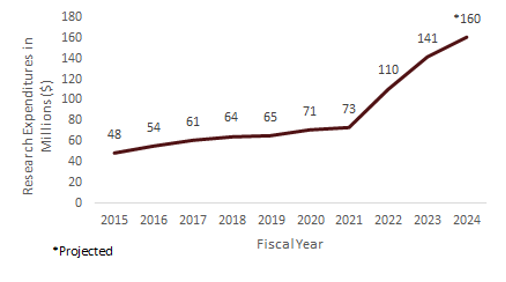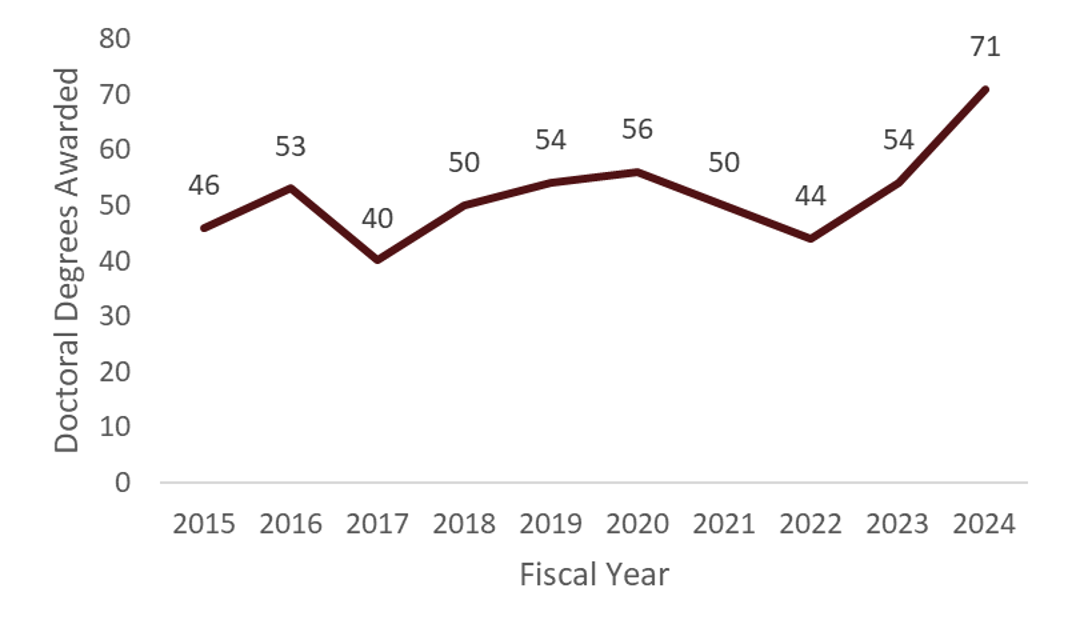Run to R1 Progress
-
2023-2024
To reach R1 status by 2027 and maintain it thereafter, we are focused on two metrics: $50M per year in research expenditures and 70 doctoral degrees awarded per year for three straight years.
- Research Expenditures - TXST has already surpassed the research expenditures metric. In the last decade, research expenditures have more than tripled, exceeding $140M last year, and our momentum appears to be continuing. For FY24, we project over $160M in research expenditures.

2. Doctoral Degrees - We have taken a two-step approach to grow the number of doctoral degrees awarded. First, we increased funding for our current doctoral programs, and this investment is already paying off. For the Carnegie 2024 reporting period, TXST awarded 71 doctoral degrees, a 31% increase from the previous year (refer to next graph).
Our growth in new doctoral students indicates a positive trajectory. In the last three years, new doctoral students have grown 68% (77 in 2022, 88 in 2023, and 124 in 2024, compared across the same period each year).

Second, we submitted 11 doctoral program proposals to the Texas Higher Education Coordinating Board (THECB) last summer. Much headway has already been made:
- At its April and July meetings, the THECB approved PhD programs in Civil Engineering, Integrated Molecular and Biophysical Chemistry, Construction Management, Engineering Management, Mathematics, Mechanical and Manufacturing Engineering, and the Doctorate in Business Administration program.
- The virtual site visit, as part of the program review, was held on July 10 for the Doctor of Nursing Practice and was held on August 8 for the PhD in Electrical Engineering.
- The site visit for the EdD in Curriculum and Instruction program proposal is pending.
- The PhD in Sports Management program proposal is being revised for resubmission.
The last group of program proposals is expected to be on the October 24 THECB meeting agenda. Thus, we anticipate 10 of the 11 program proposals to be approved within about a year of submission, bringing our total number of doctoral/professional programs to 24.
Additional Signs of Growth
- In addition to research expenditures and PhD degrees, there are other signs of our research enterprise’s steady expansion. For example:
- For a full share of the Texas University Fund (TUF) in the next Legislative Session, we are on track to exceed the TUF threshold of $45M in Federal and private research expenditures for two straight years, with $52M in FY23 and at least $49M in FY24.
- Our intellectual property portfolio consists of 22 invention disclosures and 20 patent applications, which is a 300% increase compared to last year.
-
2022-2023
-
Investments
- Cabinet approved the allocation of $6 million of university reserves to admit 50 new PhD students for Spring and Summer 2023 in three PhD programs: Material Science, Engineering and Commercialization, Computer Science, and Aquatic Resources and Integrative Biology. As more funds become available, TXST plans to invest more in current and future PhD programs. TXST will also make available $2,000 per student, per full year, to the Graduate College to support these students, as needed.
- TXST will also set aside $200,000 to award scholarships to current students for retention purposes. The programs will have the discretion in collaboration with the dean of the Graduate College as to how they would like to deploy those funds to retain students in financial need.
- Recruiting more international and graduate students is a critical part of our Run to R1. To that end, we removed a cap that limited the funds we could invest to recruit international students through partner agencies.
- We announced a $40 million investment to recruit 50 additional Ph.D. students to current doctoral programs, add 50 new post-doctoral researchers, fund grant faculty course releases, increase graduate student tuition scholarships, and several more investments in student success and research growth.
-
Recommendations approved by the Cabinet and pending Board of Regents approval
- $2.1 million in FY2024 and $3.3 million in FY2025 to attract additional post-doctoral researchers to support our faculty members in their research endeavors. This is envisioned as one-time seed money that will eventually be replaced by future grant proposals that include post-doctoral research funding (when possible).
- $2 million per year (FY2024 through FY2026) for additional PhD tuition scholarships and course release time for faculty members to allow for devoted concentration on research.
- $50,000 per year (FY2024 through FY2026) to fund operating and marketing initiatives necessary for recruiting additional doctoral students.
This brings our total investment since we began our Run to R1 last fall to nearly $18 million.
-
Administration and Engagement
- The Division of Research held a Run to R1 Town Hall and 1K Walk/Run to provide faculty and staff the opportunity to ask questions and share feedback about TXST’s R1 trajectory.
- Cabinet approved the position of Associate Vice President for Research and Federal Relations be elevated to Vice President for Research.
- Dr. Shreek Mandayam now serves as a member of the President’s Cabinet.
- The Office of Research and Sponsored Programs was elevated to the Division of Research.
-
Effective Outcomes
- Key research metrics are on track to achieve new institutional records – including total R&D expenditures (a 40% increase over last year’s record expenditures) and a record number of admissions to our Ph.D. programs.
- The new Postdoc Researcher Catalyst program has exceeded expectations in applications submitted for the 30 funded slots.
- We exceeded previous records with 85 doctoral student applications and 45 doctoral student admissions for Summer 2023 in programs supported by our Run to R1 investment in research assistantships and tuition scholarships.
- Similarly, there were a record 343 doctoral student applications across all programs for Fall 2023.
- International FTIC student applications and admits are up a staggering 377% (+467 applications) and 213% (+136 admits), respectively, over last year.
-